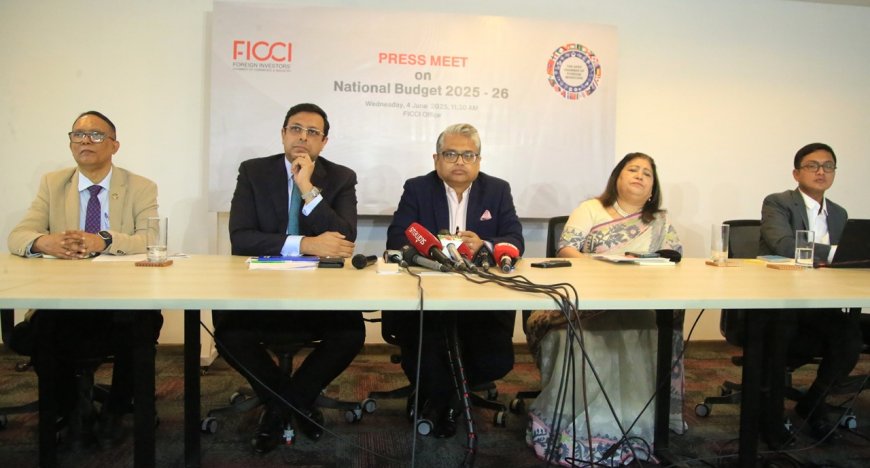FICCI Flags Fiscal Friction in Proposed Budget

The Foreign Investors’ Chamber of Commerce and Industry (FICCI), the apex body representing multinational companies operating in Bangladesh, has expressed concerns that the proposed national budget for FY2025–26 may hamper the growth of the country’s burgeoning digital commerce sector and discourage investment in the capital market.
However, FICCI welcomed the government's initiatives for automation in tax administration and the implementation of the National Single Window as part of its broader efforts toward digital transformation.
Speaking at a post-budget press conference at FICCI's Gulshan office in Dhaka on Wednesday, June 4, FICCI President Javed Akhtar said, "Reintroducing the 27.5% corporate tax rate for listed companies with less than 10% of their shares held by general investors is discriminatory. Moreover, the withdrawal of reduced tax benefits for cashless transactions is a setback to both capital market growth and the formalization of the economy."
FICCI warned that increasing the VAT rate on online sales from 5% to 15% could severely hinder the growth of Bangladesh’s digital commerce sector. Likewise, raising customs duties on beverage concentrates from 10% to 15% could escalate product prices and reduce profit margins in the industry.
Also speaking at the press conference were FICCI advisers and former presidents Rupali Haque Chowdhury and Naser Ezaz Bijoy, along with Executive Director T.I.M. Nurul Kabir.
The chamber stated that raising the minimum tax rate from 0.6% to 1% for companies and from 0.25% to 1% for individuals would disproportionately impact loss-making entities and ordinary taxpayers already burdened by inflation. “Even a company with no taxable income must pay 1% tax on its turnover, which places an additional burden on already struggling businesses,” FICCI noted.
Despite these concerns, FICCI acknowledged the government’s commitment to equitable economic transformation and reducing the fiscal deficit in the proposed national budget, which is set at BDT 7.9 trillion — equivalent to 12.7% of GDP. The government aims to achieve 6.5% GDP growth and reduce inflation to 8%, a decrease of 321 basis points from the previous year.
While FICCI appreciated the reform-oriented vision of the budget, it cautioned that certain tax implementation measures may unintentionally pressure both individuals and industries.
Expressing concern over increased tax burdens on honest and regular taxpayers, FICCI stated, “Under the revised tax slabs, salaried individuals earning between BDT 70,000 and BDT 100,000 per month could see their tax burden increase by 50% to 60%. For those earning between BDT 120,000 and BDT 175,000, the increase may range from 20% to 30%.” FICCI warned that such hikes could significantly reduce disposable income for these income brackets, negatively impacting consumer spending and quality of life.
FICCI praised the government’s target to collect BDT 4.99 trillion — 88% of total revenue — through the National Board of Revenue (NBR), as well as its plans to modernize tax administration and separate tax policy formulation from tax collection operations. However, the chamber emphasized the importance of setting realistic revenue targets and effective implementation strategies to avoid placing undue stress on compliant taxpayers.
FICCI projected that GDP growth could rise by approximately 157 basis points compared to FY2024–25 and anticipated that inflation could fall to 8% by June 2025. Nevertheless, it cautioned that the proposed increase in minimum tax rates and added pressure on both personal and corporate sectors might undermine recovery efforts despite the favorable macroeconomic outlook.
Reaffirming its stance, FICCI once again emphasized the need for an inclusive tax reform agenda, a stable and predictable fiscal environment, and a rational tax rate structure that fosters compliance and encourages investment.









































































































































































































